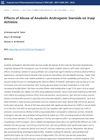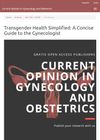 193 citations,
August 1985 in “Endocrinology”
193 citations,
August 1985 in “Endocrinology” Different animals have unique versions of the enzyme that changes testosterone into another hormone, which is important for creating effective treatments for prostate and hair loss conditions.
 17 citations,
December 2004 in “Bioorganic & Medicinal Chemistry Letters”
17 citations,
December 2004 in “Bioorganic & Medicinal Chemistry Letters” Scientists found new, better-working inhibitors for a hormone-related enzyme.
 1 citations,
July 2011 in “Climacteric”
1 citations,
July 2011 in “Climacteric” Long-term estrogen therapy in postmenopausal women can improve certain health markers, hair loss is common regardless of hormone use, stopping estrogen doesn't increase breast cancer risk, smoking does, and a balanced BMI is linked to lower mortality.
 1 citations,
January 2023 in “Metabolites”
1 citations,
January 2023 in “Metabolites” Changes in gut bacteria can contribute to the development of Polycystic Ovary Syndrome (PCOS), affecting metabolism, immunity, and causing inflammation. Treatments may involve adjusting these factors.
 1 citations,
January 2015 in “Hair therapy & transplantation”
1 citations,
January 2015 in “Hair therapy & transplantation” Some supplements and hormones can increase hair loss by raising DHT levels.
 March 2017 in “Iraqi Journal of Pharmaceutical Sciences”
March 2017 in “Iraqi Journal of Pharmaceutical Sciences” Abuse of anabolic steroids in Iraqi athletes leads to negative effects on hormones, liver and kidney function, blood sugar, and cholesterol levels.
 August 2018 in “Current opinion in gynecology and obstetrics”
August 2018 in “Current opinion in gynecology and obstetrics” Gynecologists should learn about transgender care to provide the best service.
 January 2012 in “Methods in pharmacology and toxicology”
January 2012 in “Methods in pharmacology and toxicology” TRPV3 could be a target for treating pain, skin disorders, and hair problems, but more research is needed to create effective drugs.
 3 citations,
July 2014 in “Indian Journal of Surgery”
3 citations,
July 2014 in “Indian Journal of Surgery” Sex hormones might influence bladder cancer development, and aromatase inhibitors could increase risk in postmenopausal women.
 February 2022 in “Mediators of Inflammation”
February 2022 in “Mediators of Inflammation” Women with Polycystic Ovary Syndrome (PCOS) have lower levels of a substance called DIAPH1 in their blood, which is linked to changes in sugar metabolism and insulin resistance.









